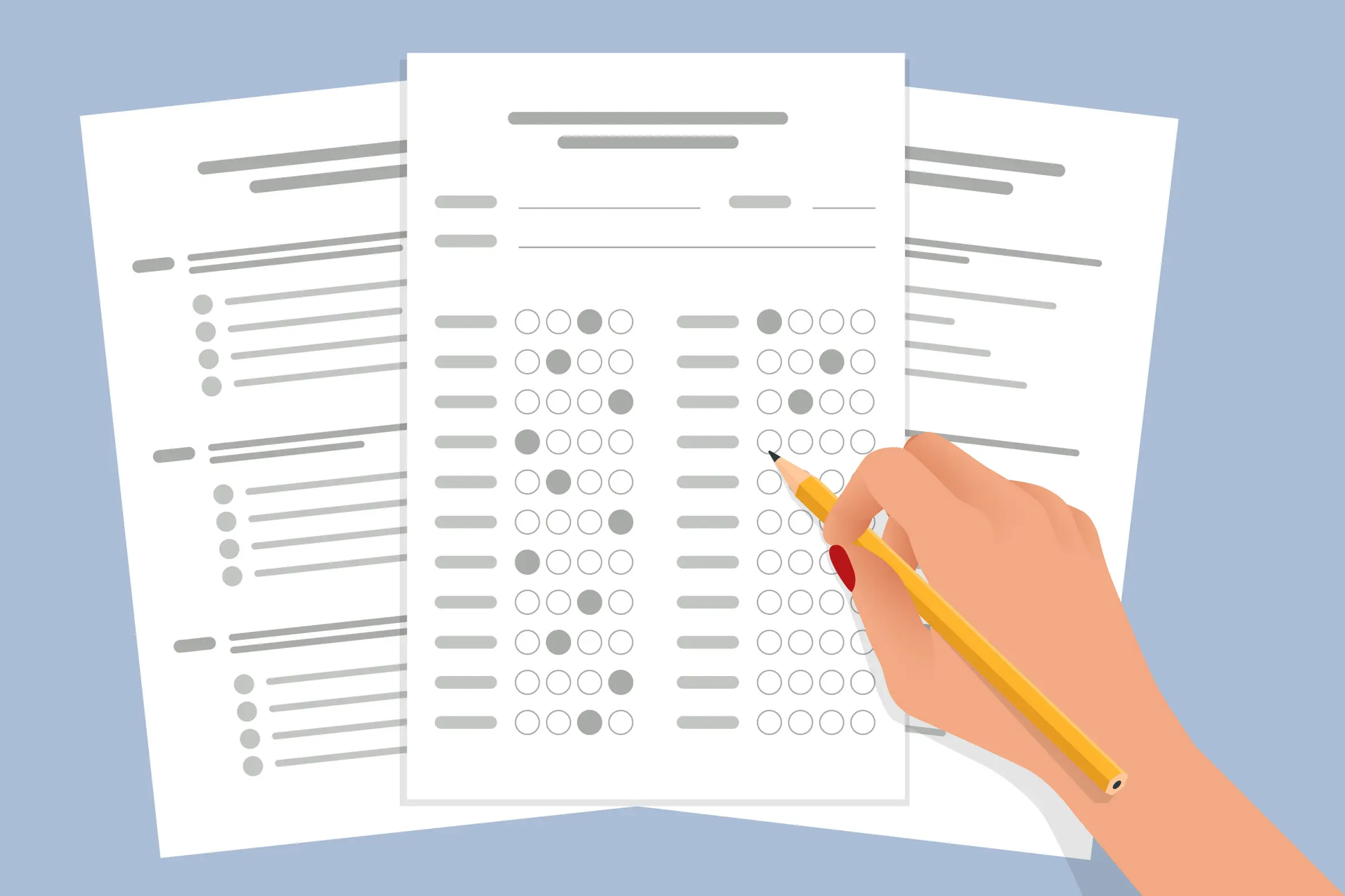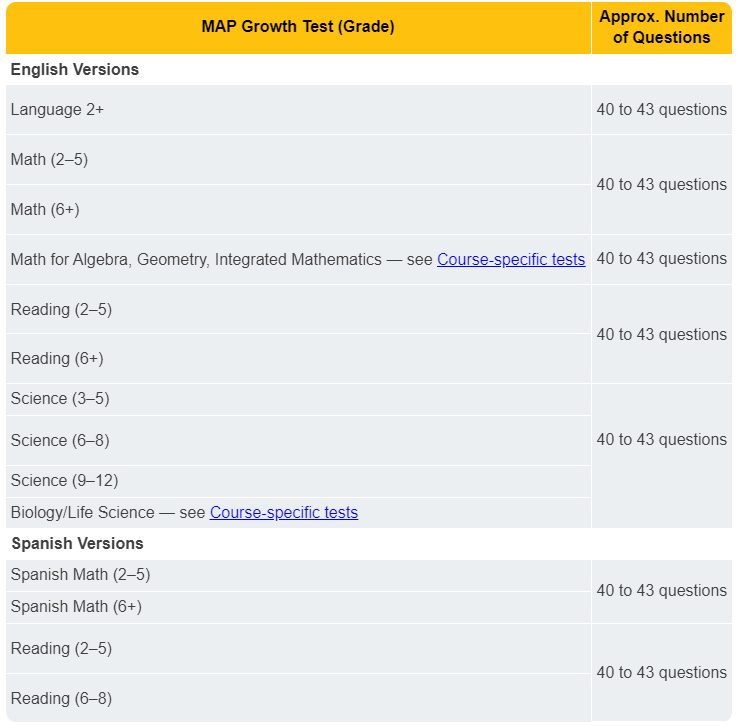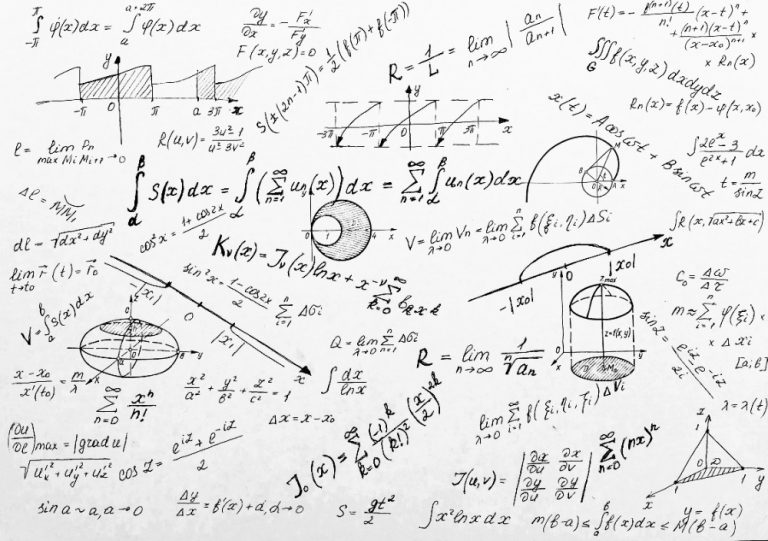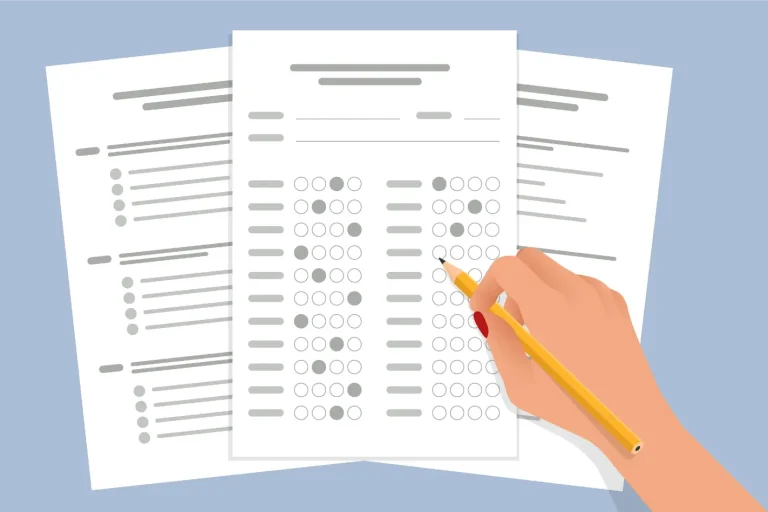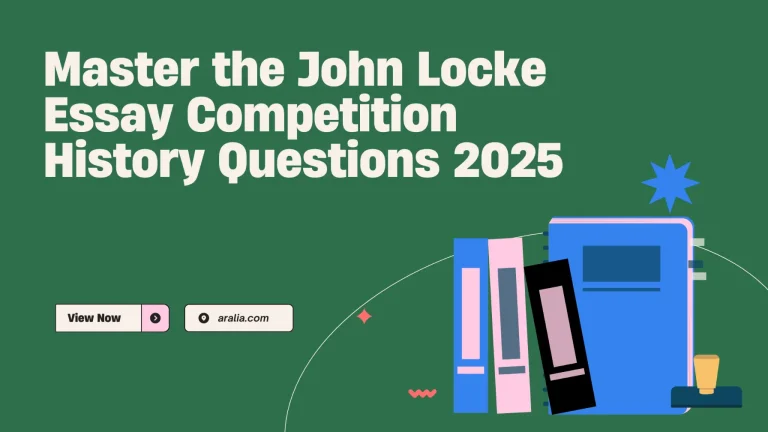Start High School Strong—Boost Your Grades and Skills with Aralia
1. What is MAP Growth Exam? What is MAP Growth?
Measures of Academic Progress (MAP) exam is the most popular test for measuring K-12 students’ learning and growth over time. Also known as MAP Growth, the MAP exam is taken online at school and tests students in four sections: math, reading, language usage, and science*. MAP assessments are created by the Northwest Evaluation Association (NWEA). Schools partner with NWEA to administer the MAP Growth exam to its students. Even if your school didn’t purchase the MAP Growth exam through NWEA, don’t worry! While the most common way to take the MAP Growth exam is free in class through your school, there are also ways for students to pay a third party and take the exam through them. We’ll get into these options later in the blog.
MAP Growth is used by over 9,500 schools and districts in 145 countries. It’s a trusted and helpful education tool for educators across the world to make sure each individual, unique student is on track! Schools in the U.S. typically have students take the exam three times throughout the school year (in the fall, winter, and spring), and this repeats every school year. This way, a student’s progress between semesters and across multiple school years can be mapped out over time. Students’ MAP Growth exam reports allow parents and teachers to compare the students’ level to others in the same school district, country, and worldwide. Teachers use the MAP Growth exam to identify if a student is at, below, or above grade level and what kind of help or challenge they need. “If a 3rd grader is reading like a 5th grader, MAP will identify that” (12 Common Questions Parents Ask about MAP Growth).
In Beijing, Shanghai, and Shenzhen, many international schools, bilingual schools, and foreign language sectors of public schools regularly use the MAP Growth exam. Aside from using the exam to measure students’ progress in academic achievement throughout the school years, some schools may even use MAP scores during the admission process as an entrance exam. One prominent Chinese international school in Beijing that uses the MAP exam is the Western Academy of Beijing (WAB)—WAB tests all their G3-10 students in the Fall Window (August-September) and Spring Window (April-May). Another leading Chinese international school using the MAP exam is Shanghai American School (SAS), which states they prefer student applicants to provide NWEA MAP Assessment in their application for grades 6-12.
2. How long is MAP Exam?
Unlike the SAT or ACT, where every student gets the same exam with the same questions, the MAP Growth exam is not your typical standardized test. MAP Growth is a computer-adaptive exam. Each student will have a different set of questions because the exam changes depending on how you answered the previous question. So, your exam will look different from your classmates!
Even though MAP Growth isn’t timed, the exam will last 45-50 minutes. Don’t worry if you finish earlier or later than your classmates—it’s not indicative of your performance. MAP gives “only as many questions as necessary” (NWEA MAP Growth).
3. What is the structure of the MAP Growth Test?
There are four test subjects for grade 3 and above: Math, Reading, Language Usage and Science. Each section will have 40-43 questions (see table below). As you answer correctly, the questions will get harder. As you answer incorrectly, the questions will get easier. By the end of the assessment, students will have answered roughly 50% of the questions correctly.
4. What does the exam test students on?
See below for a list of important skills and sample questions at the highest RIT point level for each section based on Common Core Standards for MAP Growth Grades 6+. Find more information and sample question at each RIT point level at RIT Reference Charts (Common Core Standards) and RIT Reference Charts (NWEA Standards). Read more on the difference between standards and how that affects the MAP exam in the next section of this blog!
Math Skills
- understand algebraic expressions, equations, and inequalities.
- use, compare, interpret, and build functions.
- work with ratios, rates, proportions, rational numbers, irrational numbers, complex numbers, and the coordinate plane.
- Solve for area, circumference, surface area, volume, and angle measure.
- Understand congruence and similarity in terms of transformations and apply theorems involving circles and right triangle properties.
- summarize, represent, and interpret data, including measures of center and variability.
- Investigate patterns of association in bivariate data.
- Understand and evaluate random processes and compute probabilities of events in a uniform probability model.
Reading Skills
- Make inferences and predictions, draw conclusions, and cite textual support in literary text and informational text.
- Determine key ideas, analyze the development of themes, ideas, and arguments, and summarize.
- Analyze the structure of literary texts and evaluate the author’s craft and purpose.
- Interpret figurative language and analyze literary devices.
- Analyze the structure of informational texts, evaluating texts for bias and for the quality of claims and evidence.
- Evaluate the author’s craft, determining the author’s point of view and purpose.
- Recognize and understand word relationships and structures.
- Use context clues and reference materials to decipher word meaning and nuance.
Language Usage Skills
- Use research and writing skills to plan, develop, and revise writing for purpose and audience.
- Understand the conventions of grammar and usage.
- Understand the conventions of punctuation, capitalization, and spelling.
Science Skills
- Understand the structure and processes of organisms, how matter and energy move through ecosystems, how heredity affects organisms, and how biological evolution affects the unity and diversity of life.
- Understand the interactions of matter, the relationship between force and motion, how energy converts and transfers, and the nature and use of waves.
- Understand the history of Earth in terms of the Universe, the Solar System, and the fossil record; Earth’s systems, including the cycling of matter, plate tectonics, weather, and climate; and how Earth is affected by human activity.
- Understand science and engineering practices and crosscutting concepts.
4. What does the exam test students on?
Math Skills
- understand algebraic expressions, equations, and inequalities.
- use, compare, interpret, and build functions.
- work with ratios, rates, proportions, rational numbers, irrational numbers, complex numbers, and the coordinate plane.
- Solve for area, circumference, surface area, volume, and angle measure.
- Understand congruence and similarity in terms of transformations and apply theorems involving circles and right triangle properties.
- summarize, represent, and interpret data, including measures of center and variability.
- Investigate patterns of association in bivariate data.
- Understand and evaluate random processes and compute probabilities of events in a uniform probability model.
Reading Skills
- Make inferences and predictions, draw conclusions, and cite textual support in literary text and informational text.
- Determine key ideas, analyze the development of themes, ideas, and arguments, and summarize.
- Analyze the structure of literary texts and evaluate the author’s craft and purpose.
- Interpret figurative language and analyze literary devices.
- Analyze the structure of informational texts, evaluating texts for bias and for the quality of claims and evidence.
- Evaluate the author’s craft, determining the author’s point of view and purpose.
- Recognize and understand word relationships and structures.
- Use context clues and reference materials to decipher word meaning and nuance.
Language Usage Skills
- Use research and writing skills to plan, develop, and revise writing for purpose and audience.
- Understand the conventions of grammar and usage.
- Understand the conventions of punctuation, capitalization, and spelling.
Science Skills
- Understand the structure and processes of organisms, how matter and energy move through ecosystems, how heredity affects organisms, and how biological evolution affects the unity and diversity of life.
- Understand the interactions of matter, the relationship between force and motion, how energy converts and transfers, and the nature and use of waves.
- Understand the history of Earth in terms of the Universe, the Solar System, and the fossil record; Earth’s systems, including the cycling of matter, plate tectonics, weather, and climate; and how Earth is affected by human activity.
- Understand science and engineering practices and crosscutting concepts.
5. What types of questions are on the MAP Exam?
For the most part, exam problems are multiple-choice; however, there will occasionally be other answer formats, such as fill-in-the-blank, drag-and-drop, select-all-that-apply, etc. Look at the images below to see what the MAP exam will look like.
Math Sample Questions
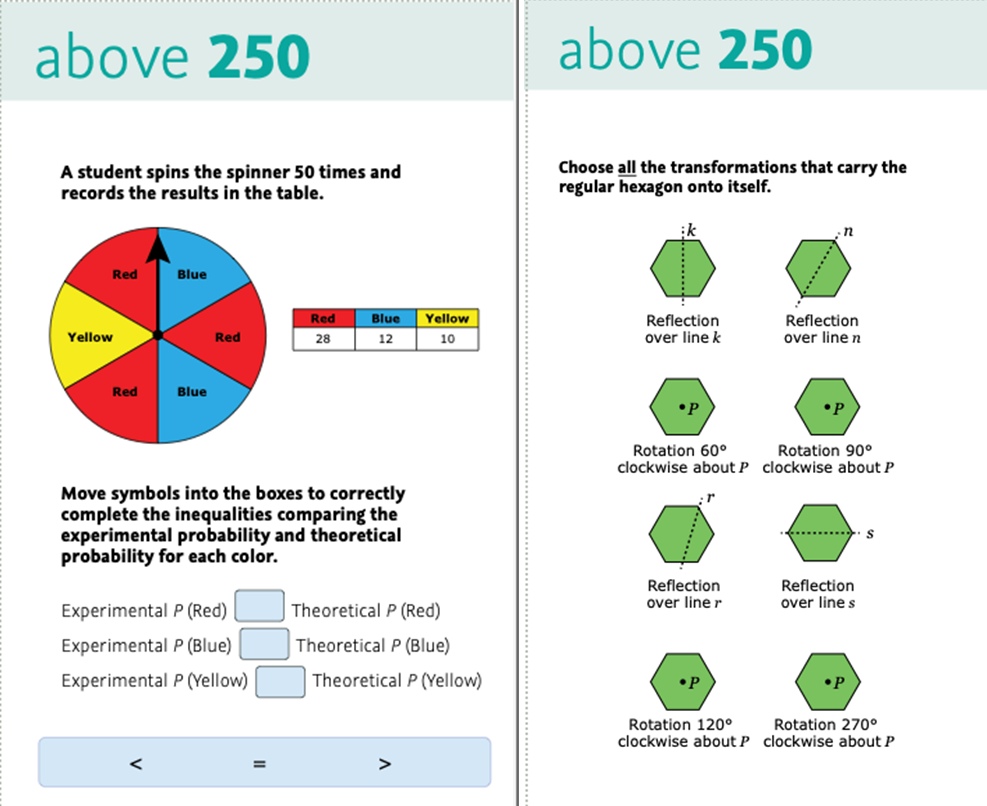
Reading Sample Questions
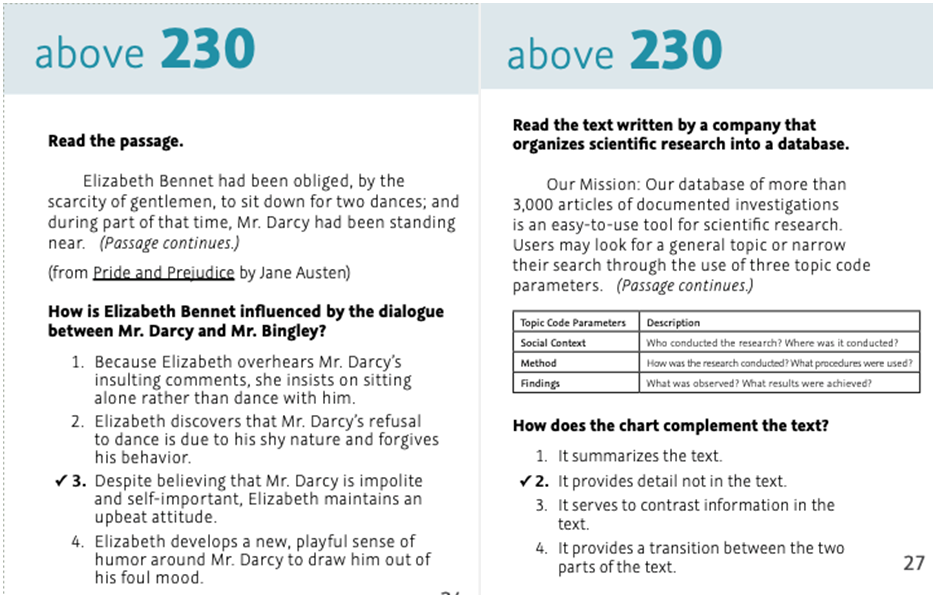
Language Usage Sample Questions
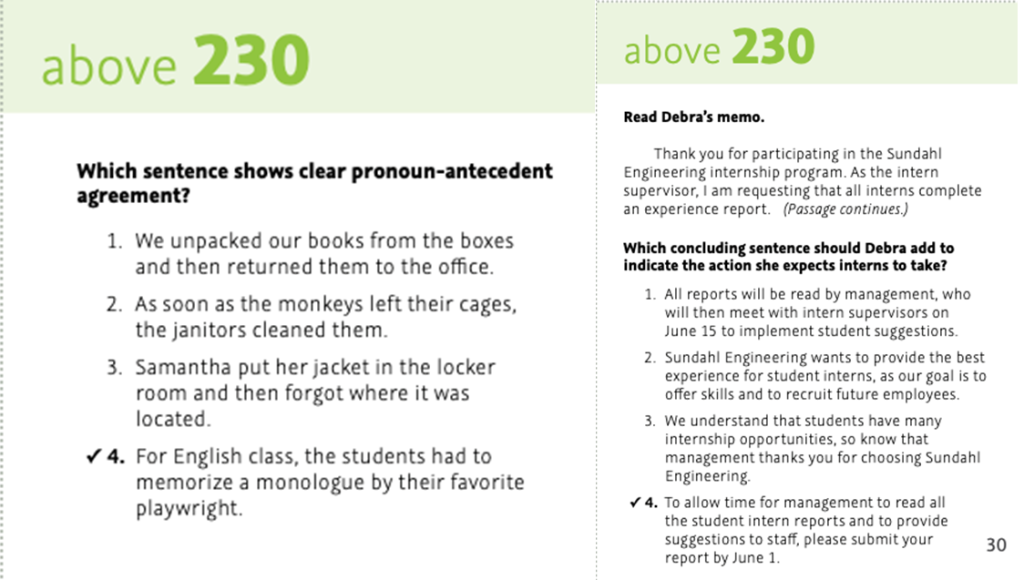
Science Sample Questions
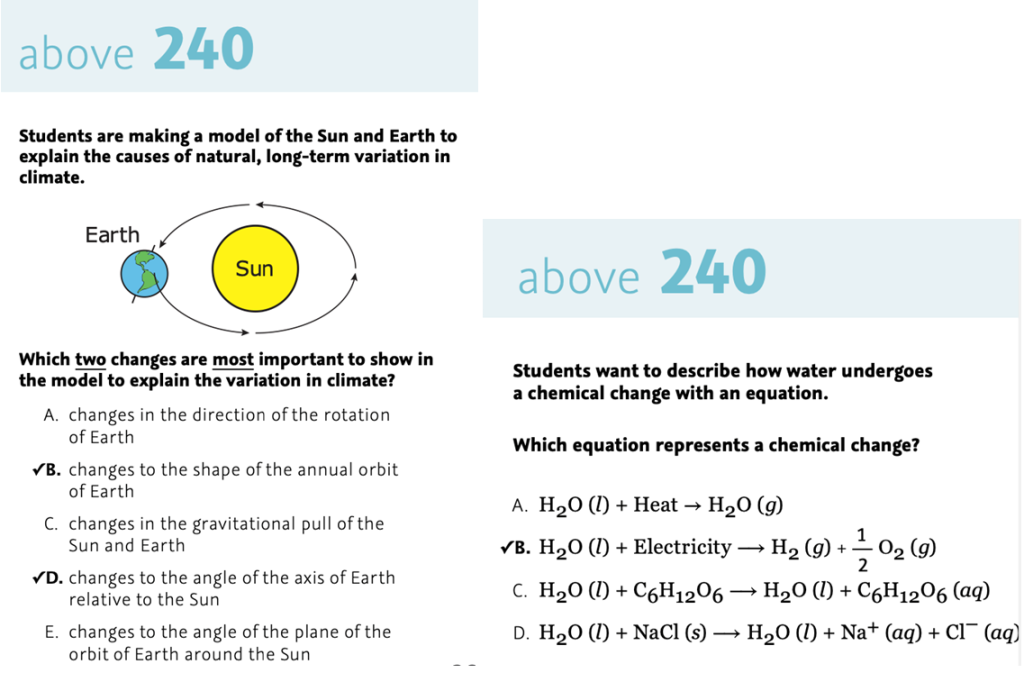
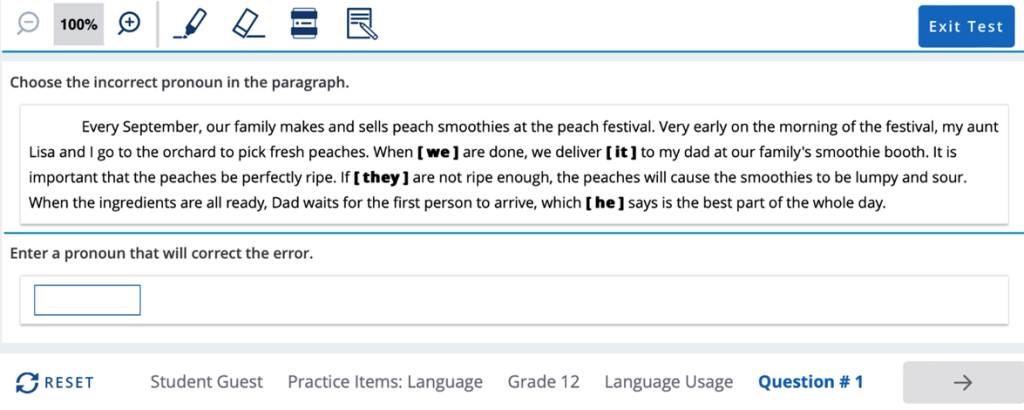
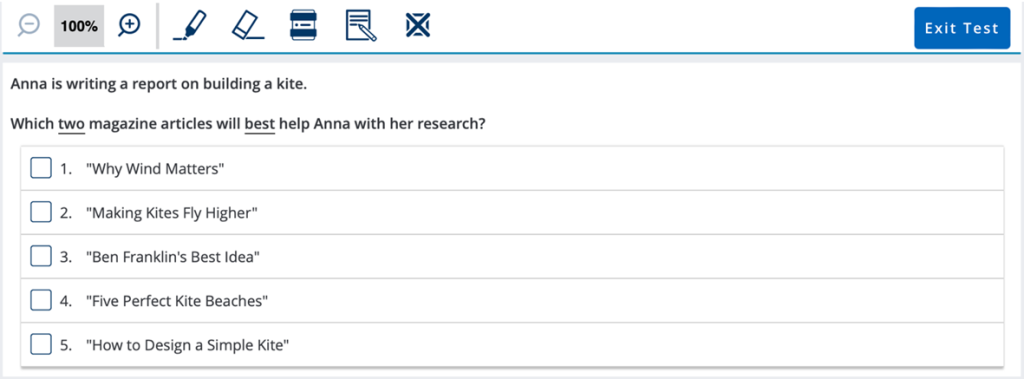
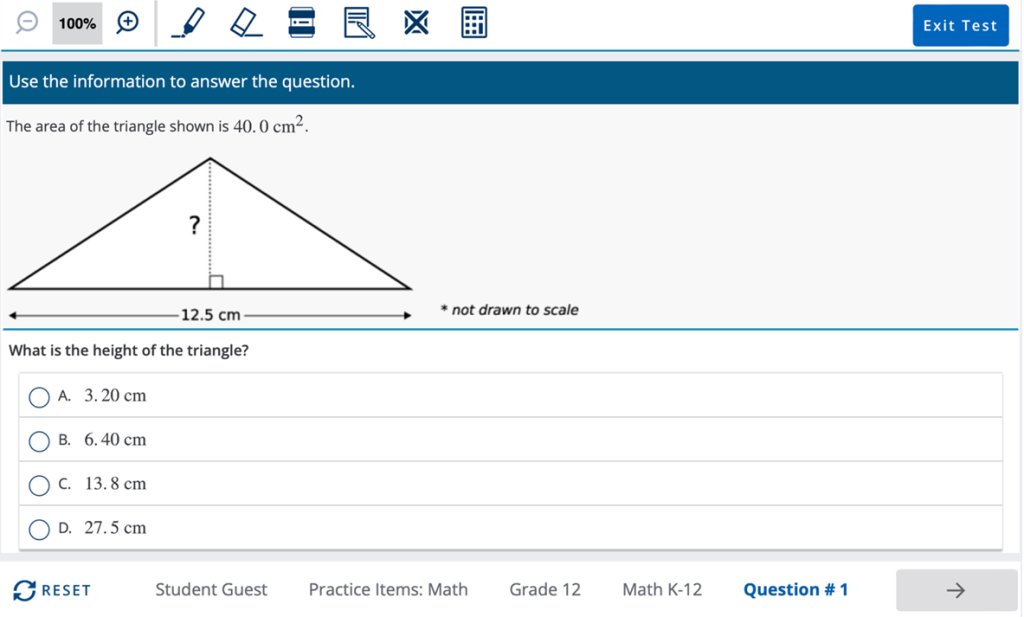
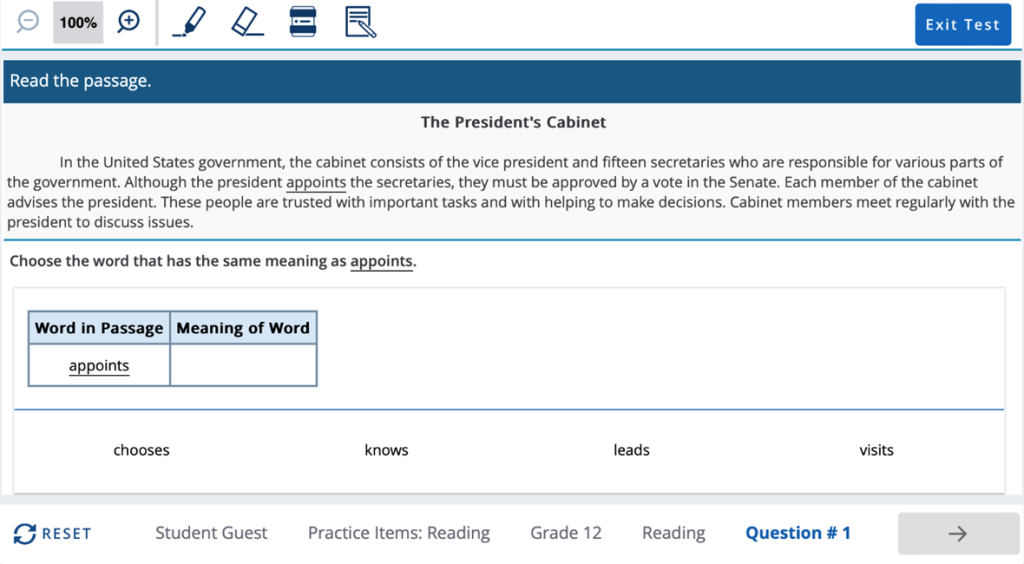
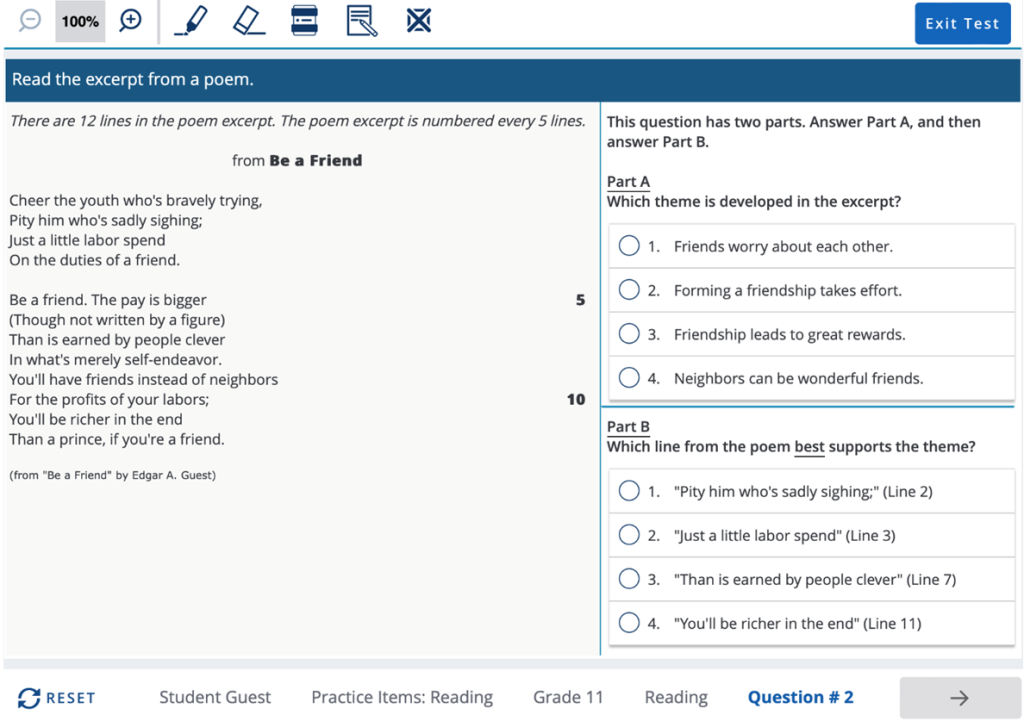
6. How do I practice for MAP Growth?
Students can take MAP Growth Practice Tests on the NWEA website. Use the following login credentials for the practice test. For the real test, each student will have their own unique login credentials given to them by their school.
Username: grow
Password: grow
Try some MAP Growth practice questions!
Click the above link. Select “Grades 2+” to also be tested in the science portion. Then, click “Practice Test.”
MAP Growth Exam Workbooks
MAP Growth Exam Workbooks are tailored resources designed to support students in their preparation for the MAP Growth assessment. These workbooks cover a diverse range of topics and subject areas tested in the exam, providing comprehensive practice materials to reinforce learning and boost performance. Students can enhance their skills, build confidence, and achieve academic goals by utilizing these workbooks alongside other study materials and strategies.
7. How do I sign up for the MAP Growth exam if my school doesn’t offer it?
Students can’t take the MAP Growth exam directly through the NWEA website, because NWEA partners with schools and there’s a price per student. If your school doesn’t offer MAP Growth, you can ask nearby schools if they administer the exam. Schools can set up a login for an unenrolled student, so you can take MAP Growth through a school that’s not your own! Unfortunately, there isn’t a list of schools offering MAP Growth. We recommend emailing and calling schools near you.
Another option is to take MAP Growth exam through third-party resources like Homeschool Boss. You can purchase either a one-time MAP Growth test or a recurring subscription to test multiple times throughout the year—this simulates how schools typically test students 3 times a year). If you’ll be taking the MAP Growth exam from home, check out this testing from home checklist.
8. How to Best Prepare for MAP Growth
Now that you understand the MAP exam, try some MAP Growth practice questions. Once you determine your weak areas, focus on improving those with an Aralia Education academic empowerment class. Aralia offers online classes taught by high school teachers from America’s best, top-ranking prep schools. Our instructors have at least 8 years of experience guiding and empowering students to reach new heights. Aralia’s teachers understand their students’ needs on a deep level and inspire students in academic as well as personal ways. Need more support on the MAP reading or language section? Boost your score with Aralia’s English Literature class. Want help with the MAP math or science sections? Aralia currently offers classes in Pre-Calculus, Geometry, Biology, and Chemistry!
Further reading: Understanding the American High School Curriculum

